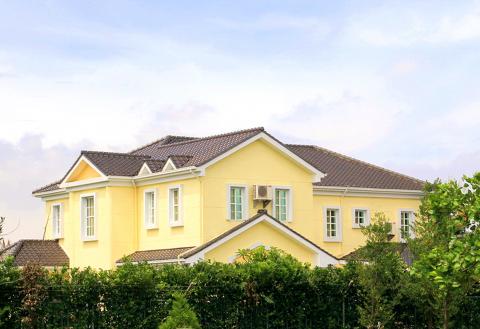The Pingtung County Government yesterday reaffirmed the legality of Democratic Progressive Party (DPP) vice presidential candidate Su Jia-chyuan’s (蘇嘉全) farmhouse in the county.
A joint press conference held by the county’s Urban and Rural Development Department, Land Administration Department and Agricultural Department came amid a series of attacks against Su by Chinese Nationalist Party (KMT) Legislator Chiu Yi (邱毅).
Su said yesterday that he would file a defamation lawsuit against Chiu.

Photo: CNA
The qualification and the purchase by Su’s wife, Hung Heng-chu (洪恆珠), of a 2,505m2 plot of agricultural land in Changchih Township (長治) and the construction of a farmhouse on the land are all legal, a county official told the press conference.
The 250.47m2 farmhouse does not violate rules governing the use of farmland, which stipulate that the percentage of a plot of agricultural land used for houses should not exceed 10 percent, Urban and Rural Development Department Director Huang Chao-chung (黃肇崇) said.
Hung was fined NT$60,000 for illegal additional constructions in 2007, but she has paid the fine and corrected all violations, Lin Chin-ho (林景和), head of the Agricultural Department, told the press conference.
Chiu has launched a series of attacks on Su’s family in recent weeks. He accused Su Chia-fu (蘇嘉富), Su Jia-chyuan’s older brother, of involvement in a business that illegally mined sand and gravel and said the grave of Su Jia-chyuan’s father was built on public land.
He also accused another older brother, Su Chia-chuan (蘇嘉川), of illegally leasing agricultural land for commercial use in Pingtung.
“Chiu’s credibility as a whistle- blower can easily be seen from his miserable record,” DPP spokesperson Chuang Ruei--hsiung (莊瑞雄) told a separate press conference, adding that Chiu was resorting to mud-throwing tactics to try to damage the DPP’s presidential campaign.
The Pingtung County Government has clarified the legality of the farmhouse, Chuang said.
As for questions about the location of the grave of Su Jia-chyuan’s father, he said the dispute was caused by historical factors since cadastral information in Taiwan has often been inaccurate and a database has not been established.

UNILATERAL MOVES: Officials have raised concerns that Beijing could try to exert economic control over Kinmen in a key development plan next year The Civil Aviation Administration (CAA) yesterday said that China has so far failed to provide any information about a new airport expected to open next year that is less than 10km from a Taiwanese airport, raising flight safety concerns. Xiamen Xiangan International Airport is only about 3km at its closest point from the islands in Kinmen County — the scene of on-off fighting during the Cold War — and construction work can be seen and heard clearly from the Taiwan side. In a written statement sent to Reuters, the CAA said that airports close to each other need detailed advanced

Tropical Storm Fung-Wong would likely strengthen into a typhoon later today as it continues moving westward across the Pacific before heading in Taiwan’s direction next week, the Central Weather Administration (CWA) said. As of 8am, Fung-Wong was about 2,190km east-southeast of Cape Oluanpi (鵝鑾鼻), Taiwan’s southernmost point, moving westward at 25kph and possibly accelerating to 31kph, CWA data showed. The tropical storm is currently over waters east of the Philippines and still far from Taiwan, CWA forecaster Tseng Chao-cheng (曾昭誠) said, adding that it could likely strengthen into a typhoon later in the day. It is forecast to reach the South China Sea

WEATHER Typhoon forming: CWA A tropical depression is expected to form into a typhoon as early as today, the Central Weather Administration (CWA) said yesterday, adding that the storm’s path remains uncertain. Before the weekend, it would move toward the Philippines, the agency said. Some time around Monday next week, it might reach a turning point, either veering north toward waters east of Taiwan or continuing westward across the Philippines, the CWA said. Meanwhile, the eye of Typhoon Kalmaegi was 1,310km south-southeast of Oluanpi (鵝鑾鼻), Taiwan’s southernmost point, as of 2am yesterday, it said. The storm is forecast to move through central

Almost a quarter of volunteer soldiers who signed up from 2021 to last year have sought early discharge, the Legislative Yuan’s Budget Center said in a report. The report said that 12,884 of 52,674 people who volunteered in the period had sought an early exit from the military, returning NT$895.96 million (US$28.86 million) to the government. In 2021, there was a 105.34 percent rise in the volunteer recruitment rate, but the number has steadily declined since then, missing recruitment targets, the Chinese-language United Daily News said, citing the report. In 2021, only 521 volunteers dropped out of the military, the report said, citing